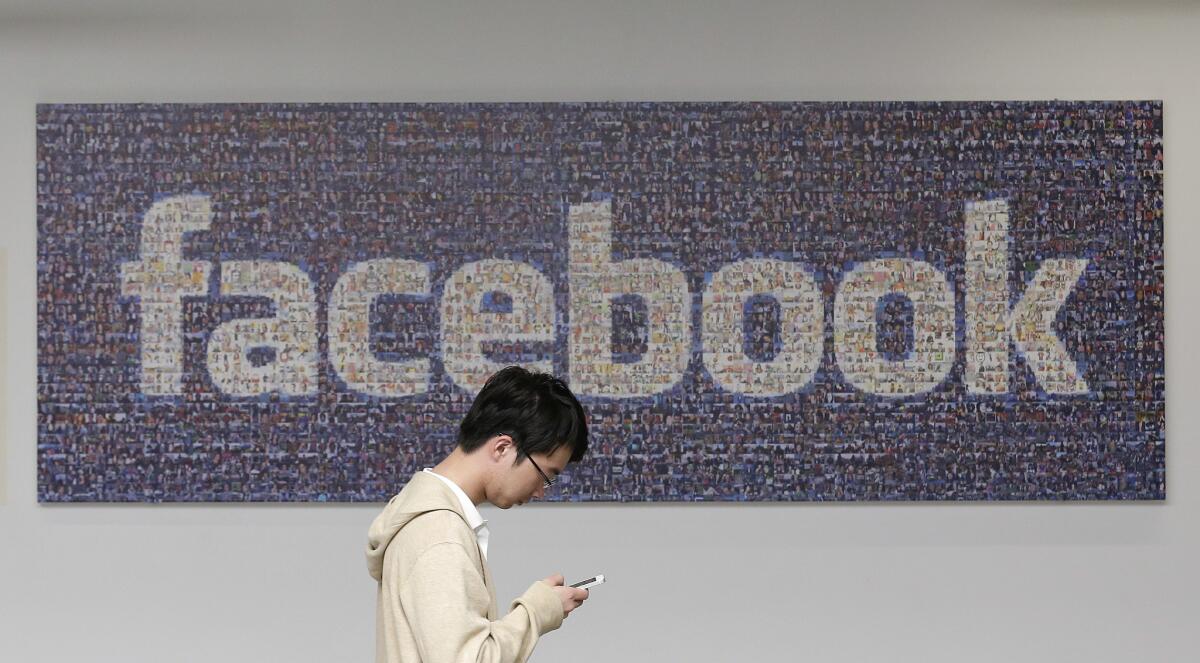I’m just so over the Facebook rainbow

A man walks past a Facebook sign on the social media company’s campus in Menlo Park, Calif. More than 26 million Facebook profile photos have taken on a rainbow hue in the days since the U.S. Supreme Court ruled that marriage is a right guaranteed under the Constitution regardless of a person’s sexual orientation.
- Share via
Is it possible to support marriage equality without opting for the rainbow filter on your Facebook profile photo?
Technically, yes. But within three days of the Supreme Court’s ruling in favor of same-sex marriage, some 26 million people had shown their support by rainbowifying their pictures with Facebook’s “celebrate pride” tool. On my feed, it appeared that at least half of my friends had opted in, their faces now awash in Roy G. Biv jubilation.
It was also kind of irritating. Though I too was thrilled at the ruling, all that Facebook rainbowification felt like blackmail: If this many people were doing it, abstainers would surely have to be — to use the preferred condemnation — “on the wrong side of history.” (I suppose the filter for that side would be an old-timey sepia tint.)
As suspect as it sounds, there was no way I was going to rainbowify my photo. First, it would require expending energy on Facebook, which I try to do as infrequently as possible given that the site has a way of making me wonder if I in fact hate people I thought I liked. Also, I’m a late adopter. It’s not that I don’t get on bandwagons; I just climb aboard only after most of the band has packed up and left for the next gig. I’m considering putting the ice bucket challenge on next summer’s calendar.
Of course, not joining is itself a form of joining, since you effectively join all the other nonjoiners. Refusing to participate in social media activism just because it feels trendy and artificial is kind of like going out of your way to not wear green on St. Patrick’s Day. It’s fine if you truly hate green or had another outfit planned. But, really, what’s the damage?
Some say the danger of symbolic, social-media-driven activism — “slactivism,” as it’s often called — is that it lets people off the hook from working toward real change. A few years ago, when a group called Invisible Children released what came to be known as the #Kony2012 video, millions of people became outraged on behalf of children kidnapped by African militia leader Joseph Kony — but few understood the complexities of the situation, let alone had any idea what to do about it.
On the other hand, without the brush fire effect of Facebook and Twitter, which can make local stories like Michael Brown’s death in Ferguson, Mo., go national in a matter of hours, the recent conversation around police and racial bias might never have gained the traction it did.
Still, it’s worth asking why so many people are so eager to advertise what ideological team they’re on. Peer pressure is surely a factor. But here’s another possibility: These displays are essentially digital bumper stickers. And maybe people are drawn to them because real bumper stickers have fallen out of favor.
Take a look around and you’ll see what I mean. It’s been suggested that the drop-off is due to fewer cars being made with the old-style chrome bumpers that seemed to beg for stickers. Or maybe it’s that more people are leasing luxury cars and no one wants to find herself at the Lexus dealership furiously scraping off a “Go Vegan” sticker when the lease period is up.
Whatever the explanation, it’s obvious that the Internet, in addition to being a giant bathroom wall, also functions as a giant car bumper. You’re forced to read fewer messages starting “My Kid Is an Honor Student” while you’re stuck in traffic on the 405, but you’re inundated instead with proud parental gushing on Facebook timelines. “I Brake For Animals” isn’t peeling off the backside of the nearest Subaru; it’s now a tear-jerking post about an abused or abandoned pet in need. (Reason No. 700 I avoid Facebook.)
Just as I never liked bumper stickers — even though I do brake for animals, and if I had a kid she would definitely be an honor student — I don’t like the idea of expressing my views through social-media-controlled rainbow-or-anything-else-ification. I stand for gay rights, but I’m also standing for my right to avoid the group hug and flag waving.
You might not see us nonjoiners, but we’re out here. Unfiltered, unbowed and not on the wrong side of history. Just maybe a little late to the party.
Twitter: @meghan_daum
Follow the Opinion section on Twitter @latimesopinion and Facebook
More to Read
A cure for the common opinion
Get thought-provoking perspectives with our weekly newsletter.
You may occasionally receive promotional content from the Los Angeles Times.







